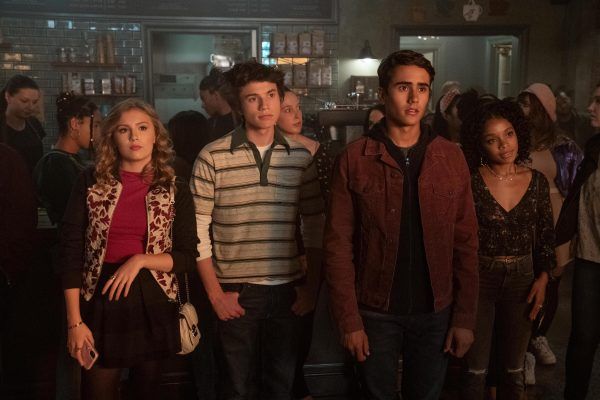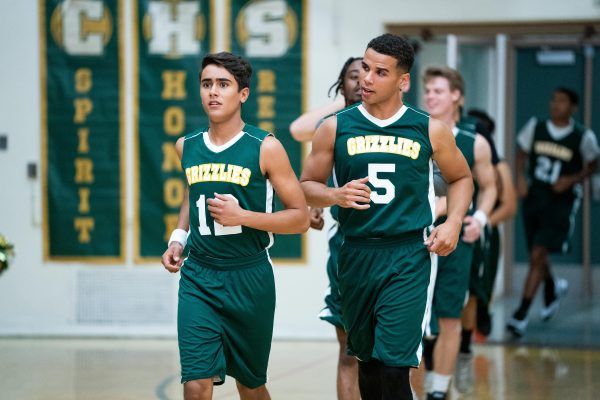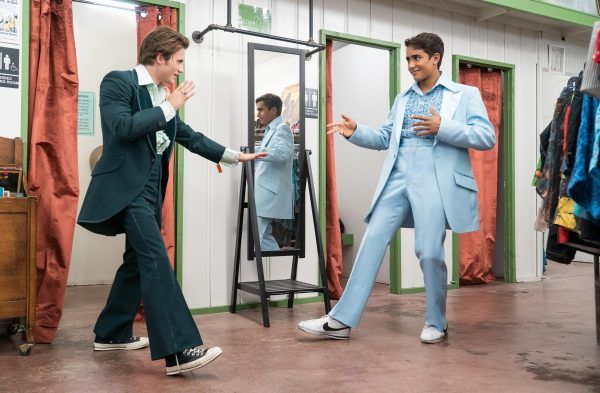Remember being a teenager, and you'd screw up pretty big, and your parents would say "I'm not mad, I'm just disappointed?" That's the energy I'm bringing into this review of Love, Victor, the Hulu spin-off of the groundbreaking 2018 gay teen rom-com Love, Simon. Because, while the first season begins with a really intriguing approach to how a spin-off should work, by the end it ultimately fails to rise above the cliches.
Love, Victor begins with the titular letter-writer (Michael Cimino) and his family moving abruptly from their original home in Texas to Atlanta. While Victor initially looks forward to getting a fresh start at a new school, things quickly become messy, especially since Victor's not just grappling with a new school, but a new awareness that his identity might not include him being 100 percent straight. So, when he hears about the Creekwood High legend of Simon (Nick Robinson, present in the show largely via voiceover), who came out and fell in love with a big romantic gesture in front of the entire school, Victor has a lot of complicated feelings — and chooses to express them in the form of his own messages.
There is a definite expectation going into Love, Victor that you've seen and loved Love, Simon — even though Victor is the new kid, he and the audience get very little in the way of a tutorial in what aspects of Creekwood society like Creek Secrets might be. But to the show's credit, it does work hard to establish its own universe and original characters.
The series features a comparatively small ensemble for a teen drama, to the point where, when one character is clearly hiding a secret about someone she used to be in a relationship with, there is literally only one potential suspect. That said, it does give us the delightful gift of comedian Ali Wong as the only teacher at Creekwood to make any sort of impression, and in general, it's reasonably well-cast. Of note: Cimino brings the vulnerability necessary to engage our empathy with Victor, and Ana Ortiz and James Martinez as his loving yet struggling parents manage to avoid the "parent trap" of losing their characters' humanity.
The biggest problem with Love, Victor might be best symbolized by Mason Gooding. This is not meant to be a slam on him specifically as an actor, or even the general idea of a 23-year-old playing a 16-year-old — after all, 20-somethings playing teenagers is an often necessary consequence of child labor laws, and thus a time-honored tradition of the genre.
The problem is that Gooding is immediately recognizable for other recent adolescent roles in what are ultimately far more complex and interesting takes on high school life. As Molly's (Beanie Feldstein) crush Nick in Booksmart and another crush figure in Freeform's Everything's Gonna Be Okay, Gooding gets the chance to find the complexity of his character. Meanwhile, the treatment of Andrew in Love, Victor is as another jock with jerkish tendencies but a heart of gold. Much like the rest of the show, it's just a touch too shallow.
That shallowness feels like a result of the show's origins. The mission statement of Love, Simon was to normalize the idea of a gay teen rom-com, to tell a happy, positive, and accepting story that just so happened to feature a same-sex love interest. Meanwhile, the best aspect of Love, Victor is how both Victor as a character and the show itself are coming from a place of anger about that. Victor looks at Simon as a financially stable cis white kid with incredibly supportive parents, and hates the fact that he doesn't have the same advantages — Victor's Latino, his family is not well off, and he has little doubt that if he came out to them, his parents would not respond with hugs.
That's what the starting point is supposed to be, anyway, and it's by far the most interesting aspect of the show, especially as Victor approaches his sexuality not as a fact, but as a question. But over the course of the first season, the very relatable rage Victor feels at the fact that life simply isn't fair loses its sharpness. It's frustrating, too, because one of the best justifications for using a popular film as a springboard for a spin-off series is to take the original premise and make it even more rich and complicated.
Love, Victor feels like it really wants to do that, but while the 10 half-hour episodes rarely drag, they also never really dig into all of the issues brought forward. While part of that is Victor going on his own journey of self-acceptance, there's also the feeling that the show simply wasn't comfortable with the idea of really exploring the rougher edges of those realities — which makes a whole lot of sense once you find out that the show was originally meant to premiere on Disney+.
And there's really nothing that makes Love, Victor inappropriate for a Disney audience, beyond acknowledging that gay people exist and sometimes teenagers have sex and go to parties. In fact, it could have gone a lot further. So if Hulu gives a second season a chance, the writers (now knowing where the show will air) might feel empowered to sharpen those dull edges, and cut open this show's true potential.
Grade: B-
Love, Victor is streaming now on Hulu.




